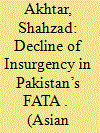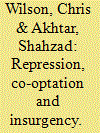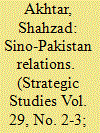| Srl | Item |
| 1 |
ID:
167847


|
|
|
|
|
| Summary/Abstract |
The Tehrik-i-Taliban Pakistan insurgency seriously challenged the Pakistani government’s writ of state in FATA from 2004 to 2008. However, by 2017, the insurgency collapsed. This paper argues that Pakistan’s counterinsurgency campaign after 2009 caused the decline of the Taliban insurgency by targeting the TTP through a true counterinsurgency operation, rather than the conventional warfare tactics used earlier. This counterinsurgency shift involved a more judicious use of force, rather than simply more force, and deployed both enemy-centric and population-centric approaches, but with a marked emphasis on the former over the latter.
|
|
|
|
|
|
|
|
|
|
|
|
|
|
|
|
| 2 |
ID:
165075


|
|
|
|
|
| Summary/Abstract |
Scholars have long identified state repression as playing a key role in the onset of insurgency. Violence by security forces increases anger against the state and assists with rebel recruitment. Yet scholars have also recognised that repression does not always lead to rebellion: in some cases it successfully quashes movements before they have begun. This study advances an argument for when and why repression leads to insurgency and sometimes does not. We contend that violence by state security forces can fail to trigger rebellion if local elites within the repressed community are simultaneously co-opted with political and economic opportunities. When elites are satisfied with local autonomy and patronage they deprive the dissident movement of local leadership and coordination. When the state uses repression against a community and at the same time abandons this mutually beneficial relationship, the insurgency has both the leadership and grassroots support it requires. We illustrate our argument by examining three cases of state violence in Asia. In two of our cases, Pakistan’s Federally Administered Tribal Areas (FATA) and Southern Thailand, repression led directly to insurgency. In the third, Papua in Indonesia, ongoing co-optation of local elites has left the movement factionalised and weak.
|
|
|
|
|
|
|
|
|
|
|
|
|
|
|
|
| 3 |
ID:
092282


|
|
|